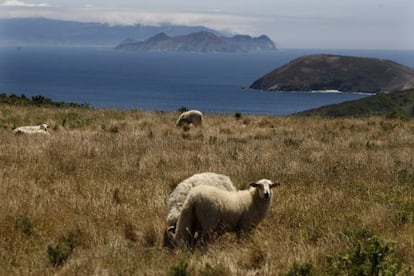How much is my island worth?
Former owners of Galician isle of Ons finally set for compensation after 70 years of uncertainty Franco expropriated the land to help Nazi U-boats refuel

In a case dating back to World War II, Spain's Supreme Court has finally decided that the former owners of a tiny island off the coast of Galicia that was first expropriated by the Franco regime, and which has remained in state hands since, are entitled to compensation.
As a result of the court's decision, the Riobó family, which owned the island for a decade until the outbreak of the Civil War, will be compensated with damages between 350,000 euros and 1.7 million euros.
Measuring some five kilometers by 1.5 kilometers, the island of Ons sits around 10 kilometers off the southern coast of Galicia at the entrance to the mouth of the ría, or fjord, of Pontevedra, and has been inhabited by fishing communities for more than 1,000 years. It is now part of the Atlantic Isles National Park.
Ons was bought by Manuel Riobó, a doctor who had made his fortune in the Philippines, in the 1920s for 250,000 pesetas. The family ran an octopus fishing and processing business out of the island for a decade, but in 1936, when the Civil War broke out, Riobó's son, fearing arrest by Franco's forces, committed suicide.
The family ran an octopus fishing and processing business there for a decade
In 1941, when Germany still looked likely to win World War II, the officially "neutral" but evidently pro-Nazi military regime of General Franco - himself a Galician - took over the island, paying one million pesetas to its 500 inhabitants.
According to Manuel Riobó Fernández, a nephew of the original owners, the idea was to use Ons as a refueling base for German U-boats. After the war ended, the family would, in theory, have been able to recover the island, but was wary of initiating legal action against the military regime.
"It was a taboo in the family to talk about the island - we were afraid of the government. The family couldn't agree on what to do," says Riobó Fernández, adding that the exact terms of the dictatorship's expropriation were never made clear to the family.
Then, in 1965, ownership of the island was passed from the Ministry of Defense to the Ministry of Agriculture.
It was a taboo in the family to speak of the island; we were afraid of Franco"
"The family had no money, and we all had to find whatever work we could. It was very, very hard in the postwar years; my father died before he was 50," Riobó Fernández recalls.
It was not until 1996, more than 20 years after the death of Franco, that Manuel Riobó was able to persuade his cousins to begin legal proceedings to recover the island. Despite the 60 years that had elapsed since Ons had been expropriated, the law at the time placed no statute of limitations on such cases. Local courts in Galicia refused to process the case, so the family went to the High Court in Madrid, which, after examining accounts dating back to the 1920s and 1930s, when the Riobó family ran its fishing business from there, ruled that the island should either revert to the family, or it should be compensated.
But the regional government of Galicia, which has taken on responsibility for the island since 1984, appealed against the decision, and took the case all the way to the Supreme Court, which in 2005 ruled in favor of the Riobó family. But the justices decided that as the island had been part of the Atlantic Isles National Park since 2002, it would end up being expropriated again, and that it would be sufficient to compensate the island's owners with the equivalent of five percent of its value.
For the last seven years, the Riobó family has been waiting for the courts to make an estimate of the island's value. State-owned environmental services group Tragsa valued the island at seven million euros, a figure much lower than the Riobó family's estimate.
"They based the figure on a price of one euro per square meter," says Riobó, who explains that the island's most valuable resource is its huge stocks of percebes, or goose barnacles, a seafood that can fetch more than 200 euros a kilo.
Aside from the Riobó family, the island's other inhabitants are also awaiting a resolution by the courts that would allow them to buy their homes.
Tu suscripción se está usando en otro dispositivo
¿Quieres añadir otro usuario a tu suscripción?
Si continúas leyendo en este dispositivo, no se podrá leer en el otro.
FlechaTu suscripción se está usando en otro dispositivo y solo puedes acceder a EL PAÍS desde un dispositivo a la vez.
Si quieres compartir tu cuenta, cambia tu suscripción a la modalidad Premium, así podrás añadir otro usuario. Cada uno accederá con su propia cuenta de email, lo que os permitirá personalizar vuestra experiencia en EL PAÍS.
¿Tienes una suscripción de empresa? Accede aquí para contratar más cuentas.
En el caso de no saber quién está usando tu cuenta, te recomendamos cambiar tu contraseña aquí.
Si decides continuar compartiendo tu cuenta, este mensaje se mostrará en tu dispositivo y en el de la otra persona que está usando tu cuenta de forma indefinida, afectando a tu experiencia de lectura. Puedes consultar aquí los términos y condiciones de la suscripción digital.








































